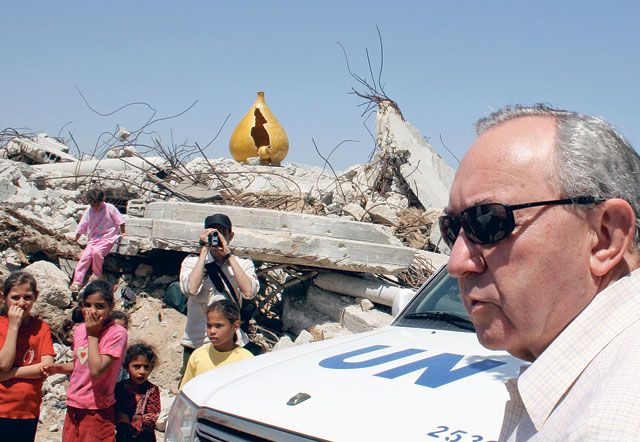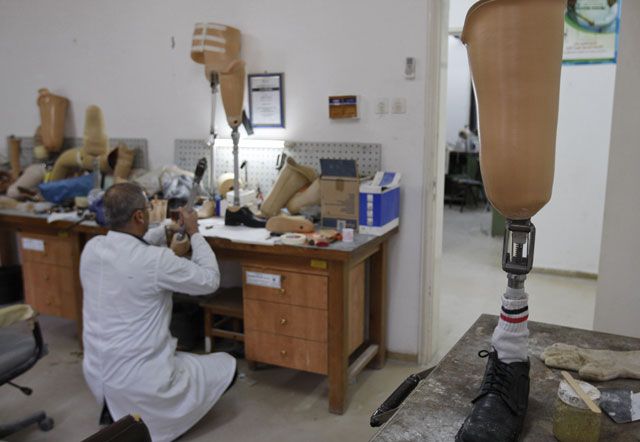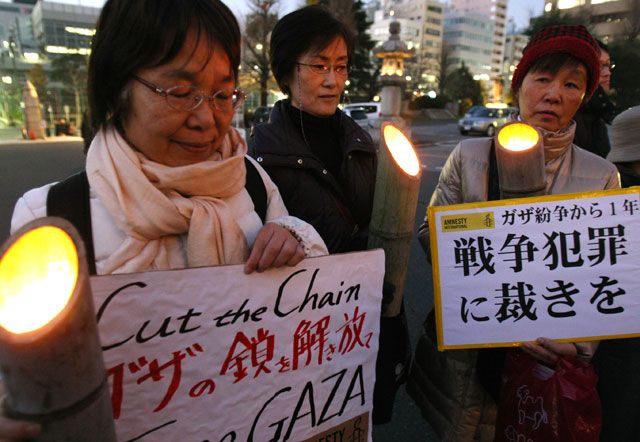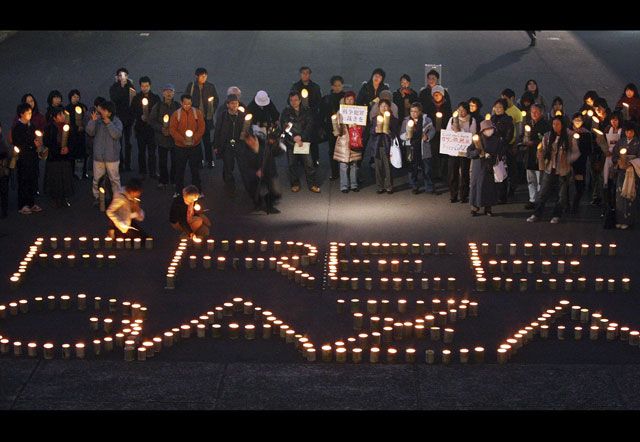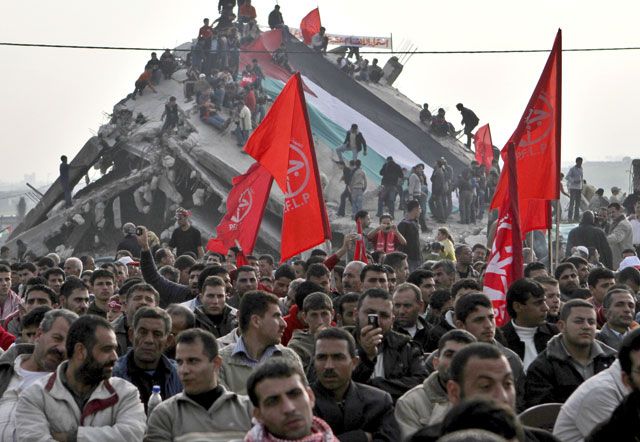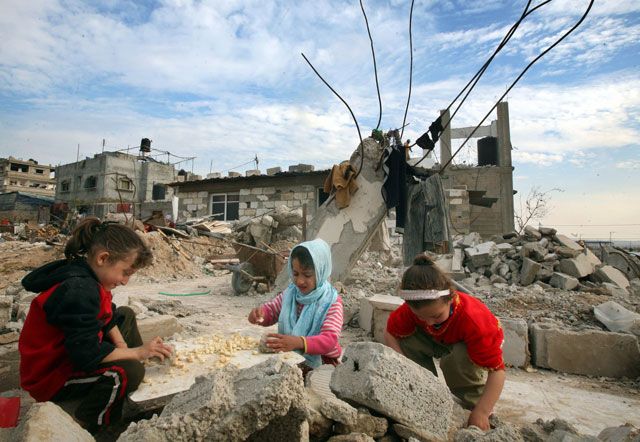Occupied Jerusalem: One year after Israel's war on Gaza Strip, which left 1,400 Palestinians dead and hundreds of homes destroyed, Palestinians are overcome with a sense of abandonment and despair in the absence of meaningful action to hold Israel accountable for its offensive and steps to end a suffocating three-year blockade.
Palestinians are divided over whether the war crime concerns raised by key human rights organisations, by the Goldstone report and by other international bodies, matter. They say the existing international legal framework is capable of imposing international criminal law but what works against other states does not apply to US-backed Israel.
International and local human rights organisations have united in their strong condemnation of Israeli actions during Operation Cast Lead in Gaza Strip from December 27 to January 18. The head of the UN Fact Finding Mission, Judge Richard Goldstone, presented his report on human rights violations by Israel and Hamas during the Gaza War to the Human Rights Council in Geneva on September 29, and urged the council and international community to put an end to impunity for violations of international law in Israel and the occupied Palestinian territories.
As a result, and because of Israel's disproportionate use of force and the high casualties among the civilian population in response to rocket attacks, Israel was faced with serious allegations of war crimes for the first time since its creation in 1948.
Tel Aviv countered the intensive international campaign and calls for meaningful independent investigations and accountability with attempts to undermine the Goldstone report and by insisting its soldiers acted within strict moral and international laws in times of war. Its argument was that its actions were in self-defence following rocket-firing by Hamas and other Palestinian groups into Israel.
‘No hope'
Human rights activist Najib Abu Rukaya said Israel is treated as a state above the law, the international community uses double standards in Israel's favour, and international legal mechanisms are paralysed when it comes to Israel.
"That is why I see no hope in holding Israel accountable for crimes committed against the Palestinians," he said.
A group of 16 leading humanitarian and human rights groups said in a report published last Tuesday that the international community "has betrayed the people of Gaza by failing to back their words with effective action to secure the ending of the Israeli blockade, which is preventing reconstruction and recovery".
Oxfam International executive director Jeremy Hobbs said: "It is not only Israel that has failed the people of Gaza with a blockade that punishes everybody living there for the acts of a few. World powers have also failed and even betrayed Gaza's ordinary citizens. They have wrung hands and issued statements, but have taken little meaningful action to attempt to change the damaging policy that prevents reconstruction, personal recovery and economic recuperation."
He said: "Hamas and other Palestinian armed groups, too, must maintain their current de facto cessation of violence and permanently cease all indiscriminate firing of rockets into Israel from Gaza. And all the Palestinian factions also need to intensify their reconciliation dialogue to pave the way for a reunified Palestinian government able to effectively provide for the needs of its civilian population."
Palestinian officials say Israel has not been held responsible for human rights violations during the 2002 raids in the West Bank, specifically in Jenin refugee camp when it razed the camp and killed some 29 Palestinians. Israel said that gunmen were hiding amid the civilians during its military operations. The Qana attacks and the 2006 assault in Lebanon also went unpunished, they said.
Internal official Israeli inquiries in all cases have resulted in finding excuses for the Israeli soldiers' actions in combat, they said.
PLO executive committee member and rights activist Hanan Ashrawi said the fact that Israel was allowed to violate international law, to act with impunity has created a pattern of behaviour that damages the international community. The message that Palestinians get from the international community is that "this is a hands-off issue" when it comes to Israel, she said.
Confusion
Ashrawi said the reasons why the international community allows Israel to act as a state above the law include confusion between sympathy with the tragedy of the Jews during the Holocaust and Israel as a state, Israel's use of anti-Semitism claims against its critics, and US strategic support for Israel.
Palestinian officials said the Nuremberg trials after the Second World War and the presence of the International Criminal Court showed it was possible to hold soldiers or officials of one country accountable internationally for war crimes. Israel, not being a member of the court, can escape trial there, but international jurisdiction could possibly allow the trial of individuals accused of war crimes in national courts of other countries.
Arrest warrants for officials in Spain and London, including the recent arrest warrant in London against former Israeli foreign minister Tzipi Livni, have raised the Israeli government's ire. Israel has pressed European states to change their laws to avoid the repetition of similar cases.
Western diplomats say the Livni incident has embarrassed the British government, which is seeking ways to amend it laws.
An Arab member of the Israeli Knesset, Ahmad Tibi, said in 1998 that universal jurisdiction was used to arrest former Chilean dictator General Augusto Pinochet in London on a warrant from Spain requesting his extradition on murder charges and human rights violations. "At that time, nobody dreamed of asking the UK to change its laws, but now when it comes to Israel, they want the laws to be changed," Tibi told Gulf News.
Israeli political analyst Menachem Klein said widespread international criticism of Israel during the Gaza War and the Goldstone report have "almost ruled out any possibility that Israel would repeat this kind of operation". He said he doubted statements by Israeli army Chief of Staff Gabi Ashkenazi in November that the army would not hesitate to operate again in Gaza to stop rocket attacks.
"I don't think Israel can use the same strategy it used in Lebanon in 2006 or in the Gaza War… International criticism at least has led to the postponement, if not cancellation of Gaza War 2 and Lebanon War 2," Klein said.
In Klein's view, Israel doesn't enjoy total impunity, and its image has been damaged internationally, but despite widespread condemnation and accusations of war crimes, its actions have not reached the level of ethnic cleansing, which allow the implementation of international criminal law on Israel.
Ashrawi said the absence of action to hold Israel accountable for rights violations makes Palestinians feel they have no recourse for the rule of law.
"If you close all legal options for the Palestinians, then you close off all peaceful means and leave violent means. You're sending the wrong message," she told the international community.
- Wafa Amr is a Palestinian journalist based in Ramallah.


